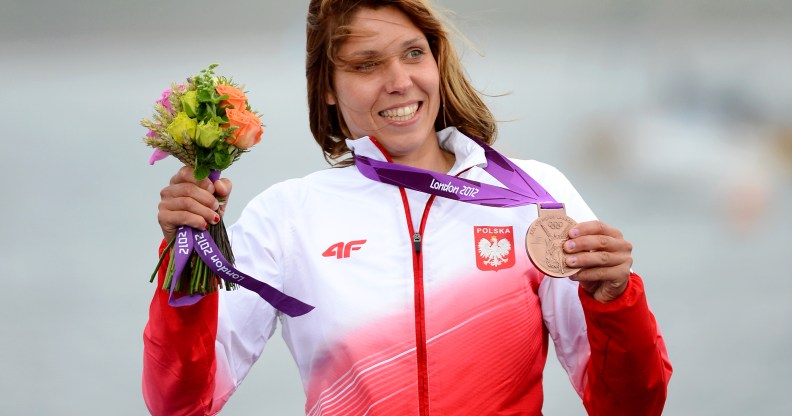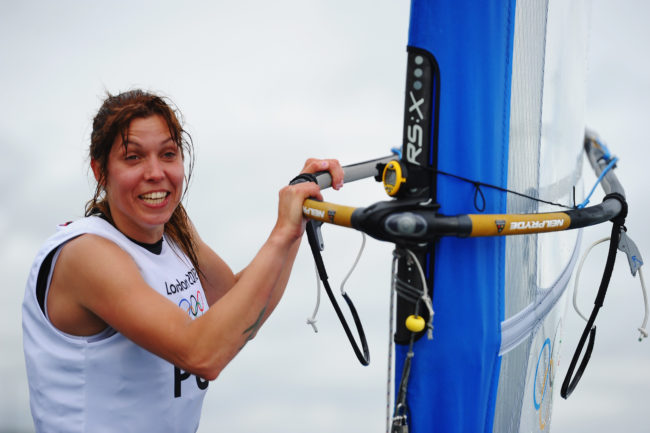Polish Olympian says people who fought Nazis would oppose LGBT rights

Poland’s Zofia Klepacka opposed the Warsaw mayor’s declaration to protect LGBT+ rights. (William WestAFP/Getty)
Polish Olympian Zofia Klepacka has criticised the mayor of Warsaw for signing a declaration to protect LGBT+ rights.
The windsurfer, who won a bronze medal at the 2012 London Olympics, declared on social media her opposition to the document mayor Rafał Trzaskowski signed in February.
“I say NO to the promotion of LGBT environments and will defend Polish tradition,” she wrote, quoted by Outsports.
The Polish Olympian then referenced the Warsaw Uprising, the unsuccessful insurrection that attempted to liberate the city from Nazi rule in 1944, ahead of the Soviet advance, implying that those who fought against Nazism in World War II wouldn’t support LGBT+ rights.
“Did my grandfather fight for such a Warsaw in the Uprising? I don’t think so … Mr. Mayor, maybe you should take care of sport in Warsaw, since it is struggling,” Klepacka wrote.

Polish Olympian Zofia Klepacka was rebuffed by a 91-year-old of the Nazi occupation. (Laurence Griffiths/Getty)
Klepacka’s comments were part of the backlash Trzaskowski received after signing the LGBT+ rights document, which is considered to be the first-ever LGBT+ declaration to be signed in central-eastern Europe, and the first document to officially recognise LGBT+ rights in Poland.
In a public display of anti-LGBT behaviour, a banner reading “Warsaw free from faggots” was unfurled at a March 1 football game in the Polish capital between top-tier teams Legia Warsaw and Miedź Legnica—a banner the Legia Warsaw football team condemned.
“Anyone who knows what human dignity is must remember that freedom is its foundation.”
— Warsaw Uprising participant Wanda Traczyk-Stawska rebuffs Zofia Klepacka
Klepacka’s inflammatory post received hundreds of reactions and sparked a larger debate. A 91-year-old Polish survivor of Nazi rule, who did, in fact, take part in the Warsaw Uprising, rebuffed her comments.
“We in the Uprising fought above all for regaining the independence of our homeland, but also for what was most important to us,” Wanda Traczyk-Stawska said in an interview with Polish news outlet Wirtualna Polska, adding: “[We fought] For our human dignity.”
She added: “Anyone who knows what human dignity is must remember that freedom is its foundation.”
Polish Olympian Zofia Klepacka stands by anti-LGBT remarks
Klepacka said her Facebook post had been deleted, but it is currently visible. She has since posted multiple times against LGBT+ rights, including a post telling parents how to oppose LGBT-inclusive classes at their children’s schools.
Finally, as controversy over her comments continued, she thanked her supporters in a message published on Facebook on Saturday (March 9), writing: “No one has the right to impose on our children something we parents don’t want!!!!”
Her position was similar to the one taken by the country’s most powerful politician Jarosław Kaczyński, leader of the ruling Law and Justice Party (PiS), who attacked Warsaw’s LGBT+ declaration during the party’s convention.
“This is an attack on the family, and an attack conducted in the worst possible way, because it’s essentially an attack on children,” he said, quoted by Emerging Europe on Monday (March 11).
Kaczyński continued: “We will say no to the attack on children. Polish parents have the right to raise their own children. We will not be intimidated. We will defend the Polish family.”
Poland is ranked 38th among 49 European countries when it comes to LGBT+ rights, according to rights group ILGA-Europe’s annual Rainbow Europe index.
The country has little in the way of LGBT+ rights protections, with no recognition of same-sex relationships or adoption and no specific laws that outlaw hate crime.

